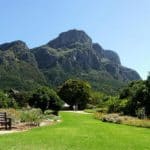AFTER Steve McClaren’s hopes of Euro 2008 qualification had washed away in the Wembley rain, the FA handed Fabio Capello the task of rebuilding a battered and bruised England.
Two years earlier, when FIFA announced the host nation for the 2010 World Cup, another rebuilding job began on the other side of the world as South Africa aimed to become the centre of planet football.
Ten grounds in nine host cities have all been specifically built for the World Cup or transformed with extensive facelifts and with little over eight months before the opening ceremony in Johannesburg on June 11, all that’s left are one or two finishing touches.
As well as the opening game, Johannesburg’s Soccer City will also host four other group games, a second round game and the final.
The 94,700 capacity stadium was originally built in 1987 but has undergone a £192m revamp which includes 10 grey arrows in the seats pointing to each of the nine other stadiums, and also Berlin’s Olympic Stadium, the site of the last final.
Ellis Stadium is Johannesburg’s second venue and the 61,000-seater stadium will host five group games, a second round game and a quarter-final.
It has witnessed the highs of South African sport, when the Springboks won the Rugby World Cup in 1995, and the lows, when 43 football fans were crushed during a game between Kaizer Chiefs and Orlando Pirates.
Semi-final venues
The two semi-finals will be held at the Green Point Stadium in South Africa’s most popular tourist city, Cape Town, and in Durban’s Moses Mabhida Stadium.
Cape Town’s brand new stadium will hold 68,000 when it is completed in December and boasts a see-through roof, while the Moses Mabhida Stadium – named after a key figure in the battle against apartheid – can hold 70,000.
The stadium includes a 350m arch above the pitch, similar to the one at Wembley.
The Nelson Mandela Bay Stadium in Port Elizabeth will host the third and fourth play-off as well as five group games, a second round match and a quarter-final. It cost £136m and holds 48,000 fans.
It was the first of the new stadiums to open and has already hosted a British and Irish Lions tour match in June.
Rustenburg’s Royal Bafokeng Stadium and the Loftus Versfeld Stadium in Pretoria will each host five group games and a second round game.
Both venues have undergone major £40m refurbishments.
The Free State Stadium in Bloemfontein – 1,395m above sea-level – has also benefited from a major investment.
Bloemfontein’s fans are said to be the loudest in the country, and so the Free State Stadium will host South Africa’s last group game.
The two smallest stadiums, the Mbombela Stadium in Nelspruit and the Peter Mokaba Stadium in Polokwane, both hold 46,000.
source: Manchester Evening News
For World Cup accommodation, packages, car hire & tours, contact us now! +27(0)83 617 3419 [email protected]





